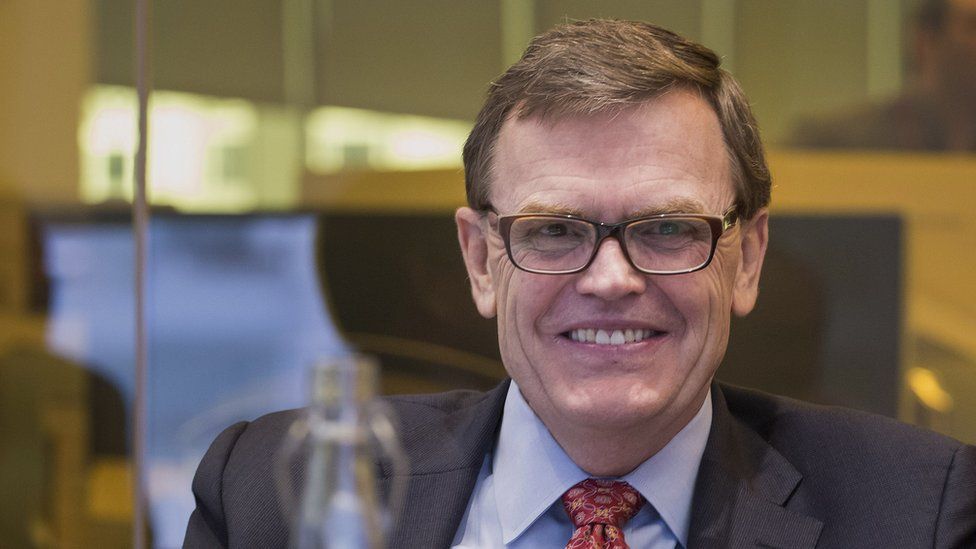David Abney: The UPS boss who rose from the bottom rung
- Published

When David Abney got a part-time job for United Parcel Service (UPS) so he could afford to take his childhood sweetheart out on dates, little did he know that he would go on to become the giant company's boss.
It was in 1974 when a then 19-year-old Mr Abney first started working for the world's largest parcel delivery firm.
A business student at Delta State University in Mississippi, at night he would work at the local UPS depot, loading packages onto vans. By day he would sleep between lectures on a sofa in the student lounge.
He was tired, but he had money to take his girlfriend out for a meal.
After graduating in 1976, while many of his friends applied for more typical graduate jobs, Mr Abney decided to go full-time with his low level UPS job.
He says he had become fascinated with how the US business worked, how through teamwork it could deliver parcels on time across the States and around the world.
Soon promoted to a UPS driver, and then a supervisor, over the next 40 years he continued to move up through the business, until, in 2014, he was appointed chief executive.
Mr Abney, a born and bred Mississippian, puts his success down to his deep Southern roots, willingness to work hard, and pride in the company. Others also cite his desire to learn about every single part of the business.
'One of their own'
Another key factor behind Mr Abney's success was having a good mentor, someone to guide, advise and inspire him.
This was a small town UPS manager, who to this day remains a close confidant.
"He saw something in me that I could not see in myself, and he took a lot of time, and gave me a lot of attention," Mr Abney says.
"We still talk," he adds, describing not unconditional support, but a mentor who was always there to give advice that he "needed to hear".
The advice helped carry him to UPS's headquarters in Atlanta, Georgia, where he would go on to oversee the group's aviation division, and its fleet of 500 planes.
He then headed the firm's entire international division, which in the early 2000s saw him lead UPS's expansion into China. Mr Abney would take 10 trips a year to the country, meeting local businesses and government officials to learn how things worked, and where the company would need to adapt.
In 2007 he was appointed chief operating officer, and then chief executive seven years later.
When Mr Abney's predecessor Scott Davis got the top job in 2008, there was some media speculation that Mr Abney and other senior managers who missed out would leave UPS.
But as Jeffrey Rosensweig, a business professor at Emory University in Atlanta, points out, the culture of jumping from company to company to secure promotions doesn't fit with either UPS or Mr Abney.
Instead people are loyal to the business, and the successful move around a lot internally.
"It's a culture [at UPS] that has more in common with Japanese culture, or military culture, where, if you are doing well, they move you so that you learn more of the business," says Prof Rosensweig.
"David had to be flexible, he had to learn. I think people [at the company] see him as talented, but still one of their own.
"They know whatever they are doing that is hard, he has done it too."
Going forward, one of UPS and Mr Abney's biggest challenges is to deal with increased competition from the likes of Amazon, which is greatly increasing its own in-house delivery business.
Like Amazon, UPS is researching delivery by drones. But Mr Abney thinks that such flying deliveries would be more useful in the developing world.
"In places like Rwanda, where 70% of the roads can be washed out by floods, I think drones can be a big help, but I don't expect that we'll see 10,000 drones flying over Atlanta," he says.
In the meantime, UPS - which has a workforce of 440,000 people - had net profits of $4.9bn (£3.7bn) last year, up 11% from $4.4bn in 2014.
Mr Abney says that UPS hasn't been "a job or a career, it's a way of life".
And he hopes that, in the future, another person who started at the very bottom of UPS can lead the company.
"We focus on promotion from within and giving people opportunities and it's amazing to see people grow and develop over the years," he says.
"So I know it's still possible for someone to move up to CEO the way I did."
Happy marriage
Growing up in the tiny city of Greenwood, Mississippi (population just 16,000), Mr Abney was the son of an insurance salesman father and homemaker mother.
He says he was determined to work hard in life and make something of himself. "I'm a big believer that you have to take the hand you're dealt," he adds.
He is proud of his Mississippi heritage, and gives to charities in the state.
He also regularly returns to Delta State University, where he is a member of the board of directors for the university's foundation, and sponsors an annual business conference at the college.
But what happened to the childhood sweetheart, who was called Sherry? They became Mr and Mrs Abney, and remain happily married four decades later.
And with Mr Abney earning more than $10m last year, paying for dinner isn't a problem any more.